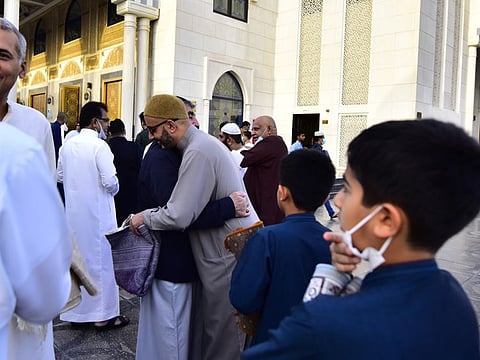UAE residents and the changing face of Eid greetings over the years
Many still prefer to wish each other in person, but social media messaging is common too

Abu Dhabi/Dubai: The exchange of greetings is a vital part of Eid, and one of the primary ways in which people share their joy on the occasion.
The exchange begins soon after the after the announcement of the moon-sighting on the evening of the last iftar for Ramadan.
This customary practise has, however, changed inextricably over the years. While visiting one another is still one of the most preferred ways to exchange greetings, many other options have cropped up over the years with the advent of technology. Evolving from greeting cards sent through traditional mail to calls over land phones, the exchange of greetings has been completely transformed by the arrival of smartphones.

Going digital
With email becoming widely used, people began exchanging electronic greetings over email and through dedicated greeting card websites.
“Over time, we also adopted SMS greetings as another convenient alternative, but I remember we would often have to stick to the character limit. Then came Blackberry and BBM!” Al Zouli remembered.
Convenience of social media
Today, social media has become the primary medium of exchange of Eid greetings, with even UAE leaders taking to Twitter and Instagram to felicitate residents.
“WhatsApp makes it very easy to make sure you reach everyone on Eid, But I must say that it is also more impersonal than ever before. This is why I make it a point to personally call all close friends and family members whom I cannot personally visit over Eid,” Al Zouli said.
Extra touch
“Hearing someone’s voice, which is now easier with video conferencing, certainly adds that extra touch to a greeting and I advise our youth to hold strong these valuable traditions,” he added.

Best-enjoyed personally

Relevant option
For Omar Elhaddad, 35, a sales manager, the digital option for exchanging greetings is also relevant. “With the evolution of technology and video calling platforms, Eid greetings have gone digital. This way, we are able to greet families and friends even if we are not able to physically be there,” he said.

Precautionary measures
In its latest announcement, the National Crisis, Emergencies and Disaster Management Authority recommended that residents need to continue to physically distance themselves and wear facemasks when visiting vulnerable individuals.
“We urge the public to use electronic alternatives to distribute cash bonuses and gifts, limit celebrations to immediate family members and relatives, as well as avoid physical greetings [wherever possible],” said Dr Taher Al Amiri, official spokesperson for NCEMA.



